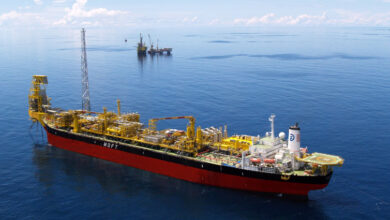Speaker: Industry must play by new rules in new energy era
The reality, however, is that commodity prices are volatile. Just a year ago, oil was trading for $120 a barrel. “In July we hit the peak, and there was a sense of irrational exuberance in people who were talking very seriously, as late as this past November, about $300 oil,” he said. “And yet how quickly it changed.”
There are many different forecasts out there about world energy supplies, and the fact is, all of them are plausible, he said. “There’s a tremendous amount of elasticity in the system both on the part of demand and on the part of supply.”
From the demand side, statistics from an IEA report released in 2008 show that there has been growing efficiency in energy consumption around the world, particularly over the past 30 years. In fact, he believes that bigger gains in energy efficiency will materialize in the coming years as technologies and innovations progress.
OIL THE KEY PLAYER
Today, there is no question that oil is the predominant ingredient in the overall energy basket, alongside other smaller ones like natural gas, coal and various alternative energies. However, the real question is: Will oil maintain that dominant status?
“Chances are, given all the new innovations and challenges coming from alternative energy sources, oil may start losing a part of that share,” Dr Saleri asserted. Its share may drop from the current share of 40% of the total world energy to the lower-30 percentile – or even lower.
“Oil is definitely positioned to be the dominant force, but not under the current rules. It has to adopt to the new realities of the planet,” he continued.
He also asserted that none of the national oil companies are doing well as far as replacing reserves, saying replacement ratios are approaching “dangerously low.”
Statistically, looking at the last century, the industry has achieved only a roughly 35% extraction efficiency. “That means out of three barrels, we only take one barrel to the consumers,” he said. “Technically and scientifically, there’s no reason that the recoveries shouldn’t be a lot higher.”
But don’t worry, he said, because this can actually be read as good news for the industry. “The fact that current processes are very inefficient says that there’s an opportunity for efficiency and for wealth creation.”
NEGATIVES VS POSITIVES
Looking ahead, there are undoubtedly many challenges for this business – resource nationalism, manpower constraints, global warming and social/political factors. And not least of all, he continued, many alternative energies, particularly renewables, are poised to make significant advances because of technological breakthroughs.
Yet Dr Saleri reminded the audience that, considering everything, the positives still outweigh all the negatives. Why? “Number one is technology. Never before in the industry has there been such a rapid adoption of new technology, which is really changing the industry. That’s why I believe the extraction rates will go up dramatically in the coming decades. There is a spirit of innovation that has come in.”
Other factors such as the increasing mobility of intellectual property and capital, the emergence of new business models and bolder expectations in recovery and sustainability all add to the industry’s booming opportunities. They’re allowing new niche-technology companies and “mutant entities” to come into the market in ways not seen before.
“Oil must compete to retain its pre-eminence. You cannot play the game that you’re playing today and hope that 10, 20, 30 years from now, you’re still going to be the pre-eminent source of energy for the planet. The planet is changing. People’s expectations are changing.”
“I think technology is going to be the differentiator between the winners and losers in the coming decades,” he concluded, “because every aspect of performance will be determined by how able companies are in applying existing and future technologies.”
Dr Saleri holds M.Sc. and Ph.D. degrees from the University of Virginia in chemical engineering. In 2006 he received SPE’s John Franklin Carll Award. He is a member of the Advisory Board of Petroleum Engineering at the University of Houston and has been an SPE Distinguished Member and Lecturer. He was head of reservoir management at Saudi Aramco from 1998 to 2007 and played a lead role in the company’s technological ascendancy in its upstream capabilities. He oversaw the company’s Maximum Sustained Capability (MSC) commitments at 11 million bbl/day and strategic planning for its oil and gas assets. Dr Saleri worked for Chevron from 1974 to 1992 and served as manager of reservoir engineering, Houston, Texas.




